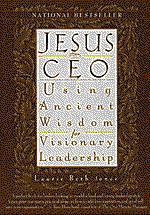 |

How To Make A Million With A Leap Of Faith.
By James DiGiovanna
Jesus CEO: Using Ancient Wisdom for Visionary Leadership,
by Laurie Beth Jones (Hyperion).
Paper, $10.95.
APPARENTLY, LAURIE BETH Jones is one of those lucky people
born without a soul. I can find no other explanation for her perverse
reading of Jesus as a business leader and the 12 apostles as his
"staff." In a trope as devoid of creativity as the book
is lacking in spirituality, each chapter title in her unselfconsciously
heretical book begins with the word "He," and places
Jesus in the role of upper management: He Formed a Team; He Believed
in Himself; He Kept in Constant Contact with His Boss; He Branched
Out; He Boiled It Down; He Served Only the Best Wine; He Trained
His Replacements; He Was a Turnaround Specialist; He Clearly Defined
Their Work-Related Benefits; He Managed From The Inside Out. Each
chapter then ends with Jesus' name substituted for the word "He"--"Jesus
formed a team...Jesus believed in himself..." etc.
 In between are a few short paragraphs of vapid, non-specific
self-help saws, the kind of overly general, feel-good platitudes
that make a reader believe something has been said, when, in fact,
no such thing has occurred.
In between are a few short paragraphs of vapid, non-specific
self-help saws, the kind of overly general, feel-good platitudes
that make a reader believe something has been said, when, in fact,
no such thing has occurred.
On the other hand, if you take the whole thing as a joke, the
book is much funnier than most of what passes for humor these
days. Jones makes wild leaps, equating, for example, Jesus' using
one loaf of bread to feed thousands with a salesman who sees everyone
he meets as a network of friends and family who are potential
customers. Both Jesus and the salesman are "Keenly Aware
of (Their) Resources." Jones closes this chapter by asking
the reader, "How frequently do you update and review all
the resources in your Rolodex?" which, as every Bible scholar
knows, is obviously the question the story of the loaves and fishes
is meant to bring forth.
Her reading would have camels effortlessly slipping through
the eyes of needles as she interprets Holy Writ as sanctioning
capitalist ownership: "Jesus clearly demonstrated a sense
of ownership of all things," "the whole essence of the
Bible is about a loving God trying to convince the children that
he is eager to give them good things."
In a chapter entitled "He Had a Passionate Commitment to
the Cause," she dismisses the idea that Jesus' driving the
money changers from the temple had anything to do with "God's
contempt for greed." Rather, she says, "I think his
heart just filled with emotion that spilled over into action...there
was definitely strong emotion there." She takes this as a
lesson to leaders to "know how to shout and cry" and
then quickly goes on to another story, distancing herself as rapidly
as she can from the possibility that Jesus was not so hot on the
dedication to excessive accumulation of wealth.
In fact, she notes that "Jesus was constantly advising his
staff on ways to identify and increase their true wealth."
She does admit that "Jesus' definition of wealth might not
be the same as ours," however, that is not the important
thing; what is important, she continues in the same sentence,
is that "he clearly defined the rewards to people who worked
for him." So, basically, a 401-K plan or eternal life are
pretty much the same thing.
The list of absurdities is far too long to fully detail here:
She refers to Jesus' sermons as "memos," she sees Jesus
as a member of the service industry because of his practice of
miraculously healing the sick, she seems to think that Jesus would
have wanted us all to be millionaires...and so on and so forth.
If you're looking for a laugh, read Jesus CEO in the bookstores;
but, I pray of you, don't buy it and thereby encourage Jones to
write Muhammed Middle Manager and The Basic Pyramid
Scheme According to Buddha.

|
 |
